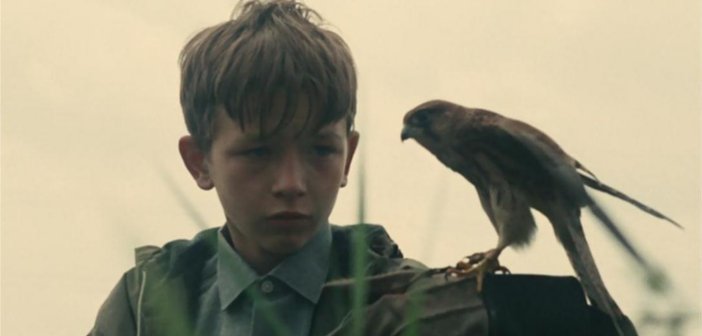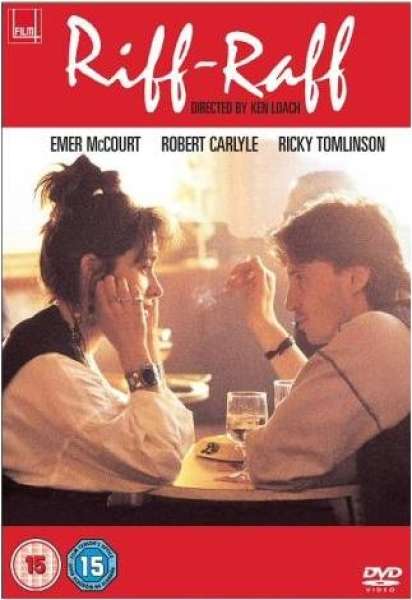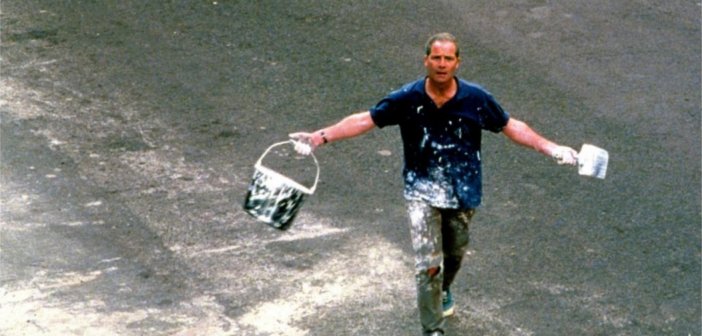Director Profile | A Look At 5 of Ken Loach’s Social Realist Masterpieces
With the upcoming release I, Daniel Blake (out 21st October), which won the Palme D’Or at Cannes 2016, this director profile will focus on British filmmaker Ken Loach. The auteur has a vast and critically acclaimed filmography, ranging from political thrillers such as Hidden Agenda (1990) to period pieces like Land and Freedom (1995) and Palme D’Or winner The Wind that Shakes the Barley, (2006), to kitchen sink dramas. However, no matter what the genre, Loach’s catalogue is marked with an authenticity, placing him in the neo-realist tradition. Like Vittorio De Sica before him, the British filmmaker favours naturalistic performances from his actors as well as on-location shooting. A socialist, he also understands the unique power of cinema to provoke discussion and perhaps implement change, often using the medium to detail the struggles of the working class. While discussing a selection of his best works, I will touch upon his verisimilitude as a director, his exploration of social issues, and the warmth he has for his blue-collar characters.
Kes (1969)
Loach’s sixth film, based on Barry Hines’ Barnsley-set novel A Kestrel for a Knave, is undeniably one of the most emotionally affecting movies about childhood, along with The 400 Blows and Boyhood. Neglected by his mother, abandoned by his father, bullied by his half-brother and mistreated by many of his teachers, working-class fifteen-year-old Billy (David Bradley) finds solace in the form of a kestrel he begins to train.
Kes sees Loach take aim at the British education system. It’s presented as backward and out of touch with the realities of the children who attend its schools. Billy is reprimanded by his teachers for lacking focus, a result of tiredness from the job he attends before school to fund his education. His headmaster – who for added authenticity was played by a real local principal – is a fool who loves the sound of his own voice, belittling his students with crude statements like “yours is the generation that never listens […] all your new music and gear, it’s all superficial”. Meanwhile, the majority of Billy’s teachers still inflict the cruel corporal punishment that they received during the “hard times” of the 20s and 30s on their students. The scene where an innocent young boy, forced to hold his bullies’ cigarettes, is caught and caned is still upsetting, even today.

Yet, despite all this doom and gloom, there is a lot of warmth and humanity to the film. The joy that Billy derives from training Kes (the name he gives his bird) and the excitement he displays describing his progress to his class is absolutely enchanting. Also, Colin Welland’s BAFTA Award-winning performance as the one teacher who treats Billy with respect is beautiful, particularly as he becomes as enraptured with Kes as his student: “there’s something about it when its flying […] did you notice how quietly were speaking? It’s like were frightened to raise our voices, like shouting in church […] it’s a sort of respect”.
As the movie progresses, the bird becomes symbolic of Billy’s potential. Although, the boy is about to graduate from school at fifteen and most likely spend his days working in his town’s mines, he is clearly capable of greater things as evidenced by how he masters falconry so quickly. The recurring image of Kes soaring into the air is metaphorically resonant for Billy, in direct contrast to his fears regarding having to go down under the earth for work. This makes the film’s devastating ending all the more heart-breaking, hinting that our protagonist will inevitably become what he most dreads.
Riff Raff (1991)

Whereas Kes subtly critiqued the society in which it was set, Riff Raff is far more explicit. Set in London during Thatcher’s Britain, it follows Stevie, played by the great Robert Carlyle from Trainspotting, who is a homeless ex-convict who finds work on a building site where workers are treated terribly. He becomes romantically involved with Sarah (Emer McCourt), a free-spirited Irish singer with dreams of fame and fortune. However, the tribulations of their lives and the time in which they live eventually put a strain on their relationship.
Riff Raff is not plot-heavy. Instead, it meanders, moving between every character within the film, giving the viewer a wider-scope of the negatives of Britain under Thatcher’s rule. For instance, emigration looms large as a young black worker on Stevie’s site gives serious thought to moving to Africa, believing he would be better treated there than in London. Meanwhile, Ricky Tomlinson plays Larry, a left-wing friend of Stevie’s who becomes a mouth-piece for Loach and screenwriter Bill Jesse. He rattles off statistics such as:
“1990. There are millions of people without homes and 250,000 construction workers without jobs […] Meanwhile, there’s millions of acres of unused land available for building on and the yards are stocked with gear. No one should be without a home”.
Larry is then later fired for complaining about the poor conditions in which he and Stevie work: “no goggles”, “poor scaffolding”, and “dodgy electric wires left in the rain” are among the problems they face. All these separate narratives combine to create an authentic portrait of early 90’s Britain, where big business was given preference over the smaller man and areas like infrastructure were ignored – leading to mass unemployment.
Like the majority of Loach’s work, his direction is unflashy. However, there are moments where one can tell how proficient the filmmaker is behind the camera. His graffiti strewn settings look grimly realistic: one wall reads “CLASS WAR,” complimenting the film’s theme. Meanwhile the central construction site always looks rickety and unsteady, creating a sense of dread whenever the characters are shown working.
Raining Stones (1993)
A contemporary updating of De Sica’s Bicycle Thieves – both films share a neo-realist style and centre on fathers attempting to secure an item to make their family’s life better – Raining Stones’ plot is deceptively simple. It follows Bob (Bruce Jones, Les from Coronation Street), an unemployed Catholic who can’t afford to pay for his daughter’s Communion dress. When his schemes to raise money with his friend Tommy (Ricky Tomlinson) consistently fail, he decides to take drastic measures in order to secure what he desires.
[youtube id=”IYv5M6A_ERk” align=”center” autoplay=”no” maxwidth=”750"]
Despite its straightforward plot, Raining Stones is far more complex when analysed. Although there is a tradition amongst Catholics to splash out on events like Communions and Conformations, no one puts pressure on Bob to buy an expensive dress. Even his parish priest Fr. Barry (Tom Hickey), who is much better fleshed out than the typical clergyman portrayed on screen, urges him to not to go to any great lengths – encouraging him to borrow second-hand clothing from the Church. Yet to Bob, the dress becomes a symbol of his inability to provide for his family and his waning pride. Through this allegory, Loach and his screenwriter Jim Allen, probe, more implicitly than in Riff Raff, the struggles working-class people often have to face in regards to maintaining their self-respect. Featuring the blend of comedy – the convoluted ways Bob and Tommy attempt to raise capital are very funny – and darkness – the scene where Bob’s family is threatened by a loan-shark is traumatic – that is seen in all the director’s work, Raining Stones marks a career-high for Loach.
My Name is Joe (1998)
Set in Glasgow, My Name is Joe stars the amazing Peter Mullan (Tyrannosaur, Top of the Lake) as the titular character, an unemployed alcoholic who in his spare time manages an amateur football team. He begins to date Sarah (Louise Goodall), a health visitor providing her services to Liam (David McKay), an ex-con and heroin addict who plays for Joe’s squad. Joe and Sarah’s romance is then challenged by Liam’s debt to a local gangster, which Joe agrees to settle by doing two drug-runs for the criminal.

My Name sees Loach and frequent collaborator Paul Laverty (who wrote I, Daniel Blake) tackling the epidemic of addiction within Glasgow council estates. In order to gain a heightened realism, the director cast smaller roles in the film with local residents, many of whom had drug and criminal pasts. Laverty’s script is ingenious, with the first half playing out almost as a Ken Loach rom-com, while also subtly providing glimpses of the darkness that is to come in the second. The denouement is an emotional gut-punch, made all the more upsetting by the hope that came before.
Winning Best Actor at Cannes 1998, Mullan (who had a small role in Riff Raff) is absolutely incredible as Joe. The actor has a natural hostility and anger to him which is both utilised and subverted here. Joe is an utterly sympathetic character who, for much of the movie, is attempting to supress his inner-demons. However, due to external forces, he can’t and his anger is unleased in a vicious action set-piece so skilfully staged by Loach. Although he is not being primarily known as an action director, the viewer feels every hit. It is also a testament to Mullan, as well as Goodhall (who is excellent, adding a lively warmth), that the love story is the most gripping part of the film as opposed to the crime elements.
Sweet Sixteen (2002)

Loach’s 2002 effort plays out almost like a “best of” for the director: it centres on a fifteen-year-old protagonist, a la Kes, features the same themes and setting as My Name is Joe, and contains a similar plot to Raining Stones. The film is as raw and powerful as all these works. The protagonist is Liam, a teenager just a few weeks shy of turning sixteen, whose family (aside from his sister) are drug dealers. His mother, Jean (Michelle Coulter), is currently serving a prison sentence for her abusive boyfriend, Stan (Gary McCormack) and will be released just days before Liam’s birthday. The teen believes that he can keep Jean out of trouble by buying her a home where he and her can live in peace together, away from corrupting influences. He and his friend Pinball (William Ruane) attempts to raise money by turning to crime.
Loach wisely does not cast big name performers in his socially-conscience films, as they would clash with his realist and gritty aesthetic. He instead selects character actors (e.g. Carlyle, Tomlinson, Mullan) or unknowns who feel authentic in the environments he portrays. Such is the case with Sweet Sixteen. Martin Compston (who went on to star in critically acclaimed fare like Red Road or The Disappearance of Alice Creed) is fantastic as Liam in his first ever role. He imbues his character with a subtle puppy-dog innocence, which lurks just beneath his abrasive manner. Equally fantastic and then unknown is William Ruane, who collaborated with Loach again on The Wind that Shakes the Barley and The Angels Share (2012). As Liam’s drug addicted best friend, he feels utterly real and disturbing, particularly in the pair’s final scene together.
Paul Laverty’s script (which won Best Screenplay at Cannes in 2002) is impressive in how it makes the viewer sympathise with the participants of Glasgow’s “ned” subculture, a derogatory term for Scottish youths from council estates associated with violence. It does this by subtly examining the social factors that cause young people to turn to crime. The viewer empathises with Liam due to the love he shares for his mother (who cares more for her drug peddling boyfriend than her son) and because, under different circumstances, he could go on to do greater things. In the first scene of the film, we see our protagonist describing the planets to a group of younger children staring through a telescope. It’s just a brief snippet of Liam’s intelligence but it makes it all the more upsetting when we eventually see the teenager putting this intellect to poor use, employing it to navigate the Glasgow crime world.
[y[youtube id=”WWEpdJ8zcXI” align=”center” autoplay=”no” maxwidth=”750"]p>
Order to watch the five films
- Raining Stones
- Kes
- My Name is Joe
- Riff Raff
- Sweet Sixteen
Also worth checking out
Having directed forty-two features, there are plenty of other acclaimed films by Loach to recommend including Hidden Agenda (1990), Ladybird Ladybird (1994), Land and Freedom (1995), Carla’s Song (1996), Bread and Roses (2000), The Wind that Shakes the Barley (2006), Looking for Eric (2009) and The Angels’ Share (2012).

